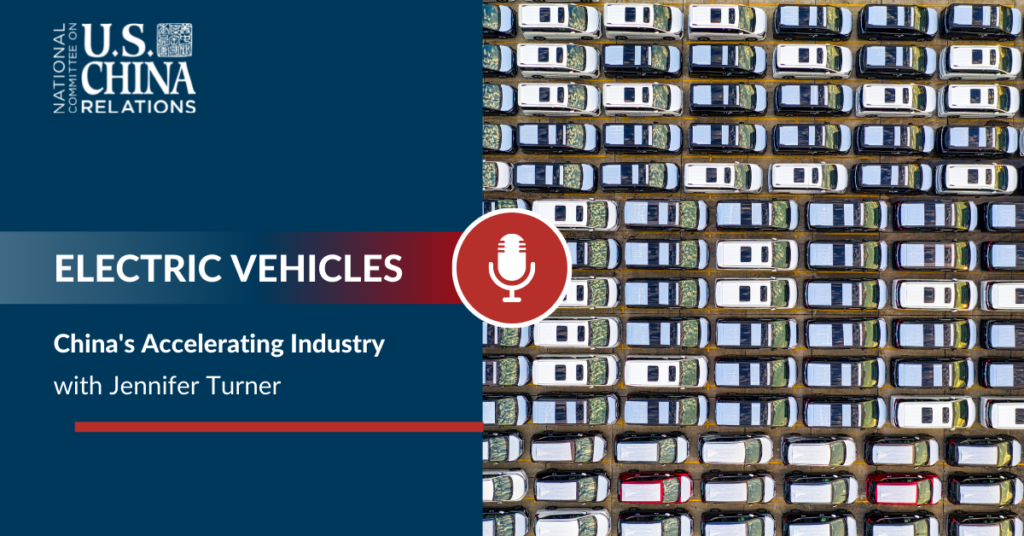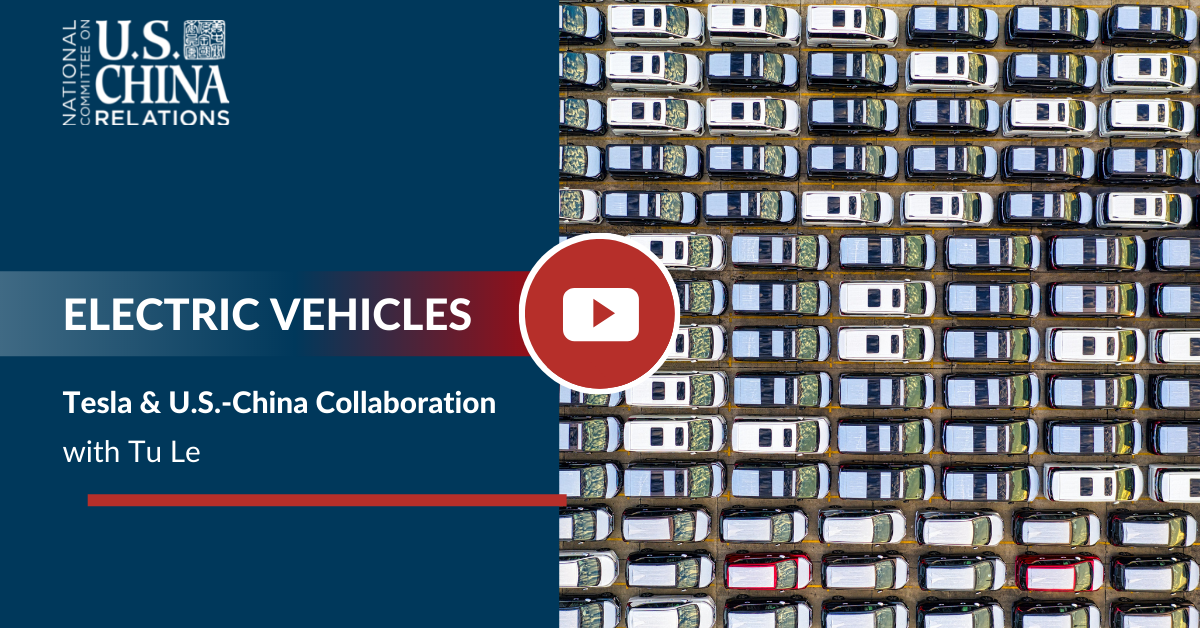This episode is part of the National Committee’s U.S.-China HORIZONS series.
China has become a world leader in electric vehicle production and promotion. Over the last few years, China’s increasing dominance in the market has pressured other countries and companies to invest in their own electric vehicle innovation. Director of the China Environment Forum at the Wilson Center Jennifer Turner explains China’s motivations and strategies for developing the electric vehicle market.
Speaker Bio
Jennifer Turner has been the director of the China Environment Forum at the Woodrow Wilson Center for 18 years where she creates meetings, exchanges and publications focusing on a variety of energy and environmental challenges facing China, particularly on water, energy and green civil society issues. She leads the Wilson Center’s Global Choke Point Initiative, which together with Circle of Blue, has produced multimedia reports, films, and convening on water-energy-food confrontations in China, India, Mexico, South Africa, and the United States. Other major initiatives include: Cooperative Competitors: Building U.S.-China Clean Energy Partnerships, From Farm to Chopsticks: Food Safety Challenges in China, and Storytelling is Serious Business Workshops For Chinese Environmental Professionals.
Jennifer also serves as editor of the Wilson Center’s journal, the China Environment Series and most recently coauthored China’s Water-Energy-Food Roadmap. She received a Ph.D. in public policy and comparative politics in 1997 from Indiana University, Bloomington. Her dissertation examined local government innovation in implementing water policies in China.
Transcript
How big is the electric vehicle industry in China?
Jennifer Turner: China has pretty much overtaken the world market on electric vehicles. Last year, they sold 50% of all electric vehicles produced in the world. And this jaw-dropping acceleration in electric vehicles has happened in a very short time. In 2014, the U.S. was producing and selling twice as many electric vehicles as China. Today, China is three times larger in terms of the production and sales of electric vehicles. So, they’re pretty much in the process of stealing the market, but they’re driving other countries around the world to also put their foot on the gas in terms of building electric vehicles in the world. Besides cars, China’s also cornering the global market on electric buses. It’s a very quiet revolution in this space. Shenzhen, a giant city across from Hong Kong, in the last couple of years has converted its 16,000 city buses to electric. They want to be a model for other Chinese cities to go electric. The company that’s done this, BYD, is also starting to operate in Latin America – Chile, Colombia, Ecuador, there are about four cities there that have invited BYD in there to see if they can electrify their buses.
How will innovation in China affect the American electric vehicle industry?
Turner: Now, while China is not going to export their electric vehicles in the near future, they’ve changed the conversation on electric vehicles, and we’re seeing Ford Motor and a lot of the other big U.S. car companies starting to put a lot more money into electric vehicles.
Besides the vehicles themselves, there’s the battery companies. I already noted BYD, BAIC, Brilliant. Those three companies have been forming partnerships with some U.S. and European car companies to help them take EV batteries to the next level.
For 30-some years, U.S. and European car companies have been coming into China and forming joint ventures and really created the car market of internal combustion engines. And now, the Chinese government has decided that by 2035, they’re going to ban internal combustion engines in China. This is a game-changer and unclear if they’re really going to meet that goal, but they’ve completely changed the conversation around vehicles around the world.
Why has China encouraged the growth of its electric vehicle industry?
Turner: China is focusing really heavily on developing electric vehicles for three main reasons. One is air pollution. Chinese cities are some of the most polluted in the world. They’ve worked on controlling pollution emissions from coal-fired power plants, but now car emissions, because of the massive growth in cars over the past 20 years, is really becoming a major source of smog. So they want electric vehicles to help clear up the pollution issue. Chinese government leaders are also really concerned about oil dependency. And by going to electric vehicles, they hope that they won’t have to continue importing a lot of oil. The third and perhaps most important reason for at least for a lot of the people listening here is, China wants to dominate in a new market.
They’re going to start domestic. They have been starting to export some of their electric vehicles, but not all of the electric vehicles China is producing are super high quality yet. It’s a big boom because the government is giving lots and lots of subsidies to the sector, free land, feed-in tariffs. And so, it’s not exactly what we call a level playing field compared to the rest of the world’s car companies. Today, there’s something like 500 electric vehicle companies in China. And so, there’s this giant boom and everyone’s jumping in. And I think that we’re right at the edge now where there’s going to be kind of a Darwinism crash as the Chinese government decides to turn off the engine on the subsidies.
How has the Chinese government cultivated its new energy vehicle market?
Turner: The Chinese government has prioritized about 10 pillar economic industries in China, and about six of them relate to clean and green technologies or industries. And electric vehicles and new energy vehicles is one of their stars, a rising star. This boom in the last few years came not from bottom-up innovation, but from top-down subsidies and support from the government – everything from feed-in tariffs, tax-free, and one of my favorite incentives is in Shenzhen, Shanghai, and Beijing, it’s very difficult to get a car license unless you buy an electric vehicle. So, the government regulation is creating demand by saying, “You can get a license if you have an EV.” So, it’s not what we call a free market. That said, it’s led to the creation of a lot of Chinese companies to move into this space. And the Chinese government can start picking its leaders. It’s a unique example of how they want to develop an industry. But clearly, how this industry has been supported will raise concerns in the U.S. and Europe about unfair subsidies, etc.

